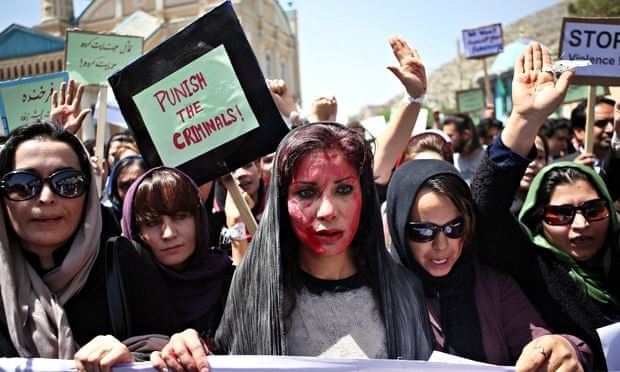By Kristin Cordell
In March this year, a young woman was beaten to death in a Kabul street and set on fire by a frenzied mob. The mostly young men were reacting to a false accusation that Farkhunda – in reality, a deeply religious woman – had burned pages of the Qur’an. This week, the attorney general of Afghanistan announced that 49 people, including 19 police officers, have been charged in relation to the crime.
But no justice can bring Farkhunda back to her family and so activists gathered in Kabul streets to tell her story. They say that she did not burn the Qur’an. That she was a kind friend and daughter.
Informally and formally, this can be seen as a sort of reconciliation and truth-telling process that has proven effective in other post-conflict contexts. According to research by the International Center for Transitional Justice, truth-telling can be especially powerful where gender-based violence has played a role.
Truth-telling is one means for this horrendous event to become a catalyst for thoughtful, empathetic discussions. No longer can men or women look the other way at the cruel and disrespectful ways men often treat Afghan women in public, especially in the capital, within walking distance of the president’s palace.
The outrage Afghan women feel is palpable. Many are telling their own story, thinking it could easily have been them in Farkhunda’s shoes. Afghan women working at the US embassy often tell of a harrowing commute. Warlords’ weapons have been replaced by the minefield of mob violence, threats and verbal harassment. According to Amnesty International, even more so for those who defend women’s rights.
In Kabul, the discussion over this horrific incident among Afghan women often ends with the international community asking itself: what can we do? How can we help? It’s as if some small tweak in our development assistance could have prevented this act – even if we know that to be empirically false.
The truth is that no amount of funding programmes to prevent gender-based violence will speed up the basic change in norms that a society must go through to reduce the potential for such violent acts. In some cases, new attention brings new tension and violence. Those who seek to hold on to power feel threatened. Fear of change incites violence.
There’s a new normal in Afghanistan, which is unsettling for many Afghan men. Since 2002, Afghan women have fought and won many battles to overcome the societal customs confining them. Change has come slowly, but now three million girls are in school. (None attended prior to 2001 during the Taliban regime.) Thousands of women are studying in universities, with demand increasing each year. A growing body of female politicians, teachers, doctors, midwives and entrepreneurs has joined the workforce.
This has been difficult for men who have been taught to shelter and protect women but who, at the same time, feel threatened by women’s advancements. Shifts in practice and perception do not happen at the speed many, especially international donors, desire.
We know that in many areas wives are still confined to their homes. Businesswomen are denied loans. Mothers give birth without professional care and their babies die. Daughters are forbidden to attend high schools and universities. Girls are forced to forgo education for early marriage. Women like Farkhunda are senselessly murdered or beaten. A 2013 UN report said women registered 1,669 cases of violence against them with the ministry of women’s affairs. Only 7% were processed under the formal justice system.
Many see Farkhunda’s murder as a tipping point. Almost anyone in Afghanistan could feel the shift when they saw thousands demonstrating in Kabul. No one can ignore the impact conveyed by the rare sight of 30 angry, defiant young Afghan women shouldering Farkhunda’s casket. Or the tears on their faces as they acted out the last moments of her life.
“Maa hama Farkhunda yem,” the women chanted at her grave. “We are all Farkhunda.”
It is clear that women in Afghanistan are changing. But will they be the innovators or early adaptors pushing social change? Are there enough of them? Can the country’s smart, educated, involved women and men move Afghan society into a prosperous and equal future where men and women sit side by side in decision-making positions? Time will tell.
In relating the story of Farkhunda as well as their own new narrative, Afghan women must work together to educate and engage their husbands, sons, brothers and fathers. They must try to understand the men’s fears. They must reach back to the days when a strong Afghan culture insisted its men honoured all women and ensured they felt safe in the home, in society and on the street.


No comments:
Post a Comment